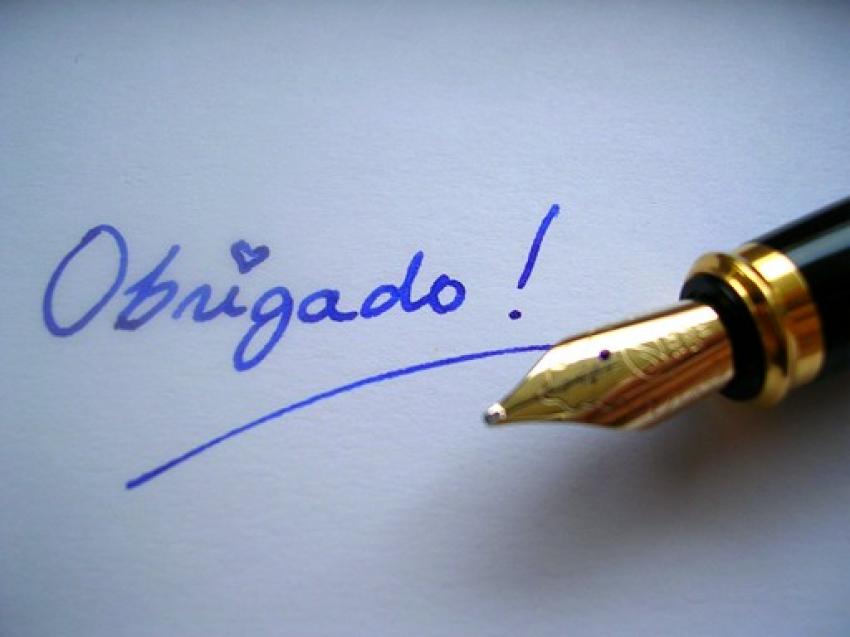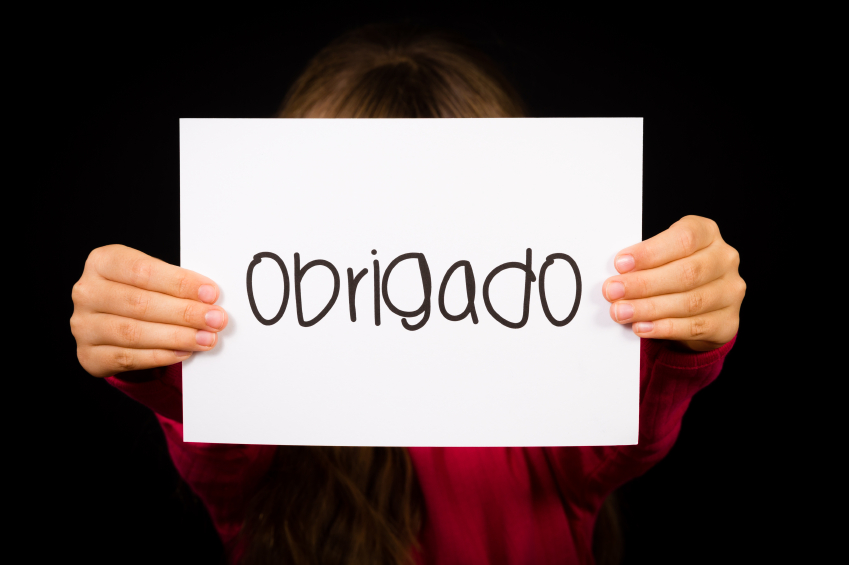Obrigado Obrigado Em Português O Design Em Forma De Coração Vetor e Ilustração RoyaltyFree

Obrigada Sticker for iOS & Android GIPHY
In this video, you will learn how native Brazilian people say "thank you". But more than that: you will learn why some people say "obrigadO" and other people.

OBRIGADO
When " obrigado " in an adjective, it means "obligated" or "forced", and thus has four variants. And they are: obrigado (masculine singular) / obrigada (feminine singular) / Obrigado (masculine plural) / obrigadas (feminine plural). This happens because it doesn't relate to who is saying it but it relates to who we're talking.

Obrigado No Dia do Obrigado, relembramos a importância de agradecer (C/ÁUDIO)
Obrigado means thank you in Portuguese.. The first word many people learn in Portuguese, obrigado is certainly extremely useful. Since the word is the past participle of the verb obrigar, it is necessary to use the appropriate gender of the word.Males should say obrigado and females ought to use obrigada.As one might imagine, this is a common mistake among beginner Portuguese learners.

Frases de obrigado. Adquira o costume de sempre agradecer!
Obrigado is an adjective ("fico-lhe obrigado" or "estou obrigado"), therefore it will agree with both gender and number: obrigado for a male speaking for himself alone, obrigada for a woman speaking for herself alone, obrigados for someone thanking as a group (of either only males or males and females), obrigadas for someone thanking as group of females (the plural form isn't commonly used.

12 melhores imagens sobre MUITO OBRIGADA no Pinterest Amigos, Placas de grupo e Gratidão
Learn more about our premium European Portuguese program called The Journey and start your free trial: https://portuguesewithcarla.com_____In t.

Frases sobre obrigado pratique a gratidão!
There are many ways to say "thank you" in Portuguese, that vary in formality and degree of gratitude: obrigado/a - thank you, informal. muito obrigado/a - thank you very much. obrigadinho/a - kindly thank you, friendly, you should smile when using this form, or be misinterpreted as being ironic/angry: thanks for nothing/thanks, but no thanks.

Muito obrigado o poder da gratidão
This is a simple and easy rule to memorize. Guys always say Obrigado. Girls always say Obrigada. It is not about who you are thanking. It is about who is saying than you in Portuguese. This is one of those rules that people don't know about or forget. I can assure you that you will hear Brazilian women saying "Obrigado".

Frases sobre obrigado pratique a gratidão!
Obrigado e obrigada são as formas mais comuns e podem ser usadas em qualquer situação, sejam situações informais, como quando você precisa agradecer um amigo ou em situações formais, quando você vai agradecer o seu chefe no trabalho. Mas existem outras formas de agradecer. São jeitos mais formais e mais informais de dizer obrigado.

Imagens de Obrigado Top Imagens
In this video, you will learn how native Brazilian people say thank you. But more than that: you will learn why some people say "obrigadO" and other people say "obrigadA". You will also learn formal and informal ways of saying thank you! In our blog, find an article about this content:

Frases sobre obrigado pratique a gratidão!
Last updated: October 18, 2021 at 12:19 pm. The Portuguese word for "thank you" is "obrigado" or "obridgada" depending on whether a male or female is saying it. Females will use the feminine form, "obrigada," while males will use the masculine form "obrigado.". You do not change the gender of the word depending on who is.

Obrigado Obrigado Em Português O Design Em Forma De Coração Vetor e Ilustração RoyaltyFree
1) Obrigado/Obrigada. This is the most common way to say Thank You in Portuguese. Men should say 'Obrigado', with an 'O' at the end. Women should say 'Obrigada', with an 'A'. Example: - Oi Marina, eu trouxe um presente para você. (Hi Marina, I brought you a present.) - Obrigada. (Thank you.)

obrigada Português & Cia
Obrigado is an adjective that can mean feeling indebted to someone, owing a favour or a gesture of kindness, it can also be synonymous with obliged, grateful or acknowledged. This adjective comes from the verb obrigar. Obrigado is also a past participle. Obrigar - to force or to oblige (verb) Obrigado - forced or obliged (past participle)

Frases sobre obrigado pratique a gratidão!
OBRIGADO - translate into English with the Portuguese-English Dictionary - Cambridge Dictionary

Obrigada 17 Imagens, Mensagens e Frases para WhatsApp
Find out when we use "obrigado" and "obrigada"! European Portuguese Beginners Lessons. To read more about it please visit my blog post here: https://thesound.

Obrigado Thank You in Portuguese Inscription Design. Modern Handwritten Calligraphy. Isolated on
Muitíssimo obrigado(a). So, some examples might be: Muitíssimo obrigado pelo dinheiro (Thank you very, very much for the money) if you are a male. Muitíssimo obrigada por ter vido (Thank you very, very much for coming) if you are a female. You can also use obrigadíssimo(a) in the same way. For example:

12 melhores imagens sobre MUITO OBRIGADA no Pinterest Amigos, Placas de grupo e Gratidão
According to Cloze Master, the Portuguese word obrigado means "thank you.". In Portuguese, this word changes depending on who is saying it. If someone is male, they should say "obrigado.". If one is female, they should say "obrigada.". This is because one is referring to oneself, i.e. "I am obligated.". Therefore, that person.